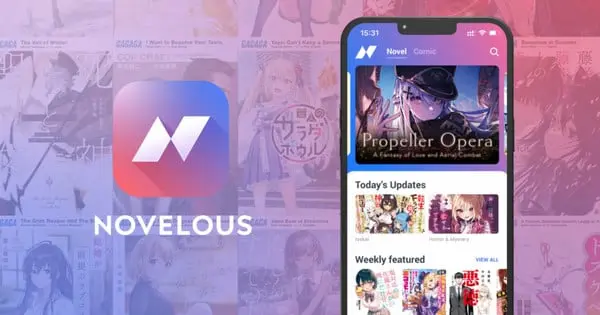Japanese publishing giant Shogakukan has officially launched its highly anticipated “Novelous” app in the United States and Canada. This new platform, available on both iOS and Android, aims to bring a vast library of light novels and manga to English-speaking audiences through the innovative use of AI translation. The app was released on Thursday, January 23, 2025, at 2:00 PM EST.
Novelous App: A New Era for Light Novel Consumption
The Novelous app represents a significant shift in how light novels are made available to international readers. By leveraging AI-assisted translation, Shogakukan hopes to drastically reduce translation costs and accelerate the release of content. This approach contrasts with traditional human translation methods, which are often more expensive and time-consuming. The company aims to have 1 million users by the end of fiscal year 2027.
AI Translation and its Impact
AI translation is at the core of the Novelous app. Shogakukan is partnering with Mantra, an AI translation startup in which they invested heavily last June. Mantra’s technology is also being used for the simultaneous English releases of the manga series The Ancient Magus Bride and Ghost and Witch. This partnership underscores Shogakukan’s commitment to leveraging AI to enhance its global reach. The use of AI-powered translation is anticipated to cut translation expenses in half.
Initial Lineup and Content
At launch, Novelous features over 80 titles, including notable works such as Witch and Hound, Too Many Losing Heroines!, and Kengan Ashura. Shogakukan plans to expand its library to 400 works within the next two years. This includes a Frieren: Beyond Journey’s End spinoff novel and Shiotaiō no Satō-san ga Ore ni Dake Amai.
The app provides a unique reading experience with features such as vertical scrolling, and the ability for users to comment on the content. Additionally, the app includes word balloons with character icons to help readers better follow the dialogue, particularly as it addresses the feedback that “Japanese names are hard to remember.”
How Novelous Works
The app offers both free and paid access to content. Users can unlock long-term access to new chapters using in-app paid coins or opt for short-term access through free coins. The inclusion of a comment section also allows readers to share their impressions and engage with the material on a deeper level.
Content Accessibility
The Novelous app also addresses the challenge of remembering Japanese names by displaying character lines in word balloons with character icons. This unique feature shows an awareness of the challenges that Western audiences face when trying to follow the dialogue in these types of stories. The app’s user interface is designed to be straightforward and user friendly.
Future Plans
Looking ahead, Shogakukan intends to include original light novels written in the West. The company also plans to hold a competition where authors can submit their English light novels for a chance to be featured on the platform. This move suggests that the company is trying to appeal to a broader audience.
Shogakukan’s History and Expansion
Founded in 1922, Shogakukan initially focused on educational magazines for elementary school children. Over time, it has grown into a major publisher of various materials, including manga, literature, dictionaries and encyclopedias. The company is part of the Hitotsubashi Group, a large Japanese conglomerate that also includes Shueisha. Shogakukan is known for publishing popular manga series such as Doraemon.
A Move Driven by Market Needs
The introduction of Novelous is also seen as a strategic response to the declining birth rates in Japan and the need to expand business into foreign markets. This push into the international market highlights the growing global demand for Japanese pop culture.
The Rise of AI in Translation
Shogakukan’s move reflects a growing trend of using AI in translation within the publishing industry. Other publishers, such as Veen Bosch & Keuning in the Netherlands, are also exploring this technology to translate books into English. While AI translation offers numerous advantages such as reduced costs and faster turnaround times, there are also challenges that come with the process.
The Debate Over AI Translation
While AI translation provides a cost-effective and efficient method, it has also sparked a debate on the quality and accuracy of the output. The Japanese Association of Translators (JAT) and many readers have expressed concerns that AI cannot handle the nuances and complexities of literary works. Some critics also believe that using AI could devalue the work of human translators.
Despite the apprehension, the use of AI translation is gaining traction. Publishers are increasingly using these tools to access a wider range of content for international audiences, especially for languages that have fewer human translators. It is important to note, that even with the use of AI, human editing is still needed to produce the best possible translations.
Potential Benefits and Concerns
The use of AI in book translation can offer benefits such as reduced time, labor, and expense, which allows publishers to offer a greater variety of work to more audiences. This technology can also make it easier to translate material from languages that don’t receive as much attention in translation due to the lack of available translators. However, many still prefer the work of human translators and worry that using AI will devalue their work.
The accuracy and literary quality of AI translation also remains a point of contention. While AI models are improving, they may still struggle with high-context narratives and cultural nuances. In order to create the best translations, a combination of both AI and human editors might be the best course of action.
The Competitive Light Novel Market
The light novel market is highly competitive, with many new series being released each year, while only a few end up becoming major hits. Many web novels are also released every day on various platforms, and authors must work hard to attract attention and be noticed by publishers. This process can be difficult, as even with a wide reader base, a web novel may not be picked up for publication. This competition in turn means that the market is constantly changing and only the best, most engaging stories end up succeeding.
Conclusion
The launch of Shogakukan’s Novelous app marks a significant moment in the global distribution of light novels and manga. By embracing AI translation, Shogakukan aims to make these works more accessible to English-speaking audiences, while also trying to address the challenges of cost and production time. However, the debate over the quality and ethics of AI translation continues. As the market develops, it will be interesting to see if AI or human translation becomes the preferred method, or if a combination of both is the most efficient way forward.










